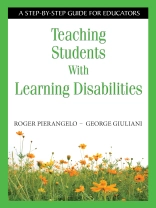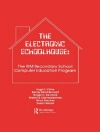‘Provides the reader with a very clear understanding of the student with learning disabilities. This book addresses in detail all the possible processing weaknesses and provides strategies to help a student access the general education curriculum. It′s something you can pick up, locate valuable information in, and refer to time and again.’
—Esther M. Eacho, Special Education Teacher
Fairfax County Public Schools, VA
Discover how to effectively meet the needs of students with learning disabilities!
Learning disabilities (LD) vary with each student, and teaching strategies for learners with LD must be responsive to individual differences. Written in an easy-to-read format by experts in special education, this step-by-step guide presents a comprehensive look at learning disabilities, such as cognitive or memory deficits, social-emotional problems, and dyslexia, and discusses appropriate academic instruction, behavioral interventions, and classroom accommodations for learners with LD.
Aligned with the reauthorization of IDEA 2004, this resource also covers communicating with parents, the school′s responsibilities in the special education process, and legal issues for educators and parents. General and special education teachers will find numerous reproducible forms, a complete glossary of terms, and information on topics such as:
- Promoting positive social interactions
- IEP development and educational placement options
- Postsecondary education options, vocational assessments, and other transition services
- The role of Response to Intervention (RTI)
Teaching Students With Learning Disabilities provides an invaluable set of tools to help teachers create a positive learning environment and foster a sense of belonging for all learners.
Tabela de Conteúdo
Dedications
About the Authors
Preface
1. Overview of Learning Disabilities
IDEA Definition of a Specific Learning Disability
Overview of Specific Learning Disabilities
Key Facts About Learning Disabilities
Causes of a Specific Learning Disability
Age of Onset for Specific Learning Disabilities
Gender Features for Specific Learning Disabilities
Cultural Features for Specific Learning Disabilities
Familial Patterns for Specific Learning Disabilities
Co-morbidity for Specific Learning Disabilities
Discrepancy in Diagnosing a Learning Disability
The Exclusionary Clause
Characteristics of Specific Learning Disabilities
Educational Implications of Specific Learning Disabilities
2. Characteristics of Children With Learning Disabilities
Overview
Academic Achievement Deficits
Language Deficits
Disorders of Attention
Achievement Discrepancy
Memory Deficits
Cognitive Deficits
Metacognition Deficits
Social-Emotional Problems
Nonverbal Learning Disorders (NLD)
Motivational and Attribution Problems
Perceptual Deficits
3. Types of Learning Disabilities
Auditory Processing Disorders
Dyscalculia (Arithmetic Disorder)
Dysgraphia (Writing Disorders)
Dyslexia (Reading Disorders)
Dysorthographia (Spelling Disorders)
Nonverbal Learning Disabilities (Nonverbal Learning Disorders or NLD)
Organizational Learning Disorders
Social Cue Disorder
Visual Processing Disorders
4. Eligibility Criteria for Learning Disabilities
Step I. Becoming Familiar With the Characteristics of Students With Specific Learning Disabilities
Step II. Determining the Procedures and Assessment Measures To Be Used
Step III. Determination of Eligibility for a Diagnosis of a Specific Learning Disability
5. Responsiveness to Intervention (RTI)
Overview of Responsiveness to Intervention (RTI)
Purpose of RTI
Importance of RTI
Is RTI a New Approach?
Core Principles of RTI
Rationale for Replacing the Discrepancy Model With RTI
Major Issues Related to the Use of the Concept of Achievement-Ability Discrepancy
Why RTI Was Considered in the Process of SLD Determination
The Role RTI Should Play in the Identification of Children With Specific Learning Disabilities
Can RTI Be Used as the Sole Determinant for SLD Classification?
In the Big Picture, How Does RTI Fit Into the Determination of LD Process?
Continuum of Intervention Support for At-Risk Students
Parent Involvement, An Important Component for Successful RTI Programs
Fidelity
The RTI Process for Teachers
What Teachers Need in Terms of Professional Development and RTI
6. Effective Teaching Strategies for Students With LD
Academic Instruction
Behavioral Interventions
Classroom Accommodations
7. Promoting Positive Social Interactions Among Students With and Without Learning Disabilities in an Inclusion Setting
Introduction
Review of Inclusion
Principles of Effective Inclusion
Why Are Social Skills Important?
Social-Cognitive Skill Development
The Role of Social Skills at School
Strategies to Foster a Sense of Belonging in the Inclusion Classroom
Creating a Positive Inclusion Classroom Climate
Teaching Social Skills Through Role-Playing and Observation
The Inclusion Classroom Teacher′s Power to Model Acceptance
Promoting Positive Social Interactions Among Students With and Without Learning Disabilities in an Inclusion Setting
8. IEP Development and Educational Placement Options for Students With Learning Disabilities
Overview of the IEP Committee
Members of the IEP Committee
Responsibilities of the IEP Committee
IDEA 2004 and IEP Committee Meeting: What to Know
Development of the Information Packet for Presentation to the IEP Committee
Required Forms
How Recommendations for Classification Are Made by the IEP Committee
Specific Educational Placement (LRE) Considerations According to IDEA 2004
Appealing the Decision of the IEP Committee
Other Roles of the IEP Committee
IEP Development
Components to Be Included in the IEP
Questions and Answers About the IEP Under IDEA 2004
9. Transition Services for Students With Learning Disabilities
The Transitional Process
The Intent of Transition Services
The Importance of Transition Services for Individuals With Learning Disabilities
The Introduction of Transition Services
The Individualized Transition Plan (ITP)
Transition Services
Special Considerations for Students With Learning Disabilities
Employment Services
Vocational Assessments
Leisure/Recreational Experiences
Advantages of Special Leisure Programs
Individual Concerns When Faced With Leisure Activities
Postsecondary Education Options
When to Begin College Planning
Understanding Legal Rights Pertaining to Postsecondary Education
Identifying the Desirable Characteristics of a College
Disability-Related Support Services
Assistive Technology
Glossary
References
Index
Sobre o autor
George Giuliani is an assistant professor at Hofstra University′s School of Education and Allied Health and Human Services, in the Department of Counseling, Research, Special Education, and Rehabilitation. He is the executive director of the National Association of Special Education Professionals, president of the National Association of Parents with Children in Special Education (NAPCSE), vice-president of the National Association of Special Education Teachers, and an educational consultant for various school districts. He has provided numerous workshops for parents and teachers on a variety of special education and psychological topics.Giuliani earned Board Certification as a Diplomate Fellow in Child and Adolescent Psychology and Forensic Psychology from the International College of Professional Psychology. Giuliani is also a New York State licensed psychologist, certified school psychologist, and has an extensive private practice focusing on children with special needs. He is a member of the American Psychological Association, New York State Psychological Association, the National Association of School Psychologists, Suffolk County Psychological Association, Psi Chi, American Association of University Professors, and the Council for Exceptional Children. Giuliani earned his BA from the College of the Holy Cross, MS from St. John′s University, JD from City University Law School, and Psy D from Rutgers University, The Graduate School of Applied and Professional Psychology.Giuliani is the coauthor of numerous books, including The Big Book of Special Education Resources and The Step-by-Step Book Series for Special Educators.












